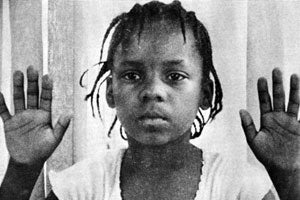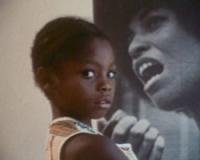Although actually her first film, Friday night’s screening of Alile Sharon Larkin’s UCLA works ended with Your Children Come Back to You (1979). This film, screened from a beautiful new print, tells the story of Tovi, a young girl whose loyalties are caught between two women—neither of whom is her natural (birth) mother—while her father is in Africa. At first, it is ambiguous which character’s side the viewer (and thereby Tovi) is supposed to take in the film. Although she is undeniably overbearing and meddling, Aunt Chris seems to have a point: It doesn’t seem responsible for Tovi’s father to go to Africa when it leaves his wife (who is, moreover, pregnant with his second child) and daughter surviving on welfare. Neither is it right for a child to grow up in such dire economic circumstances. In addition, it is initially unclear what exactly is so objectionable about Chris sharing her wealth with Tovi and her mother if, in her own words, she has “more than enough.” Not only is Tovi her biological niece, her own flesh and blood, but Chris seems to be interested in investing her money (quite literally) within the Black community—investing in its future through this child.

Furthermore, it is clear that Tovi and her stepmother do not have the best relationship; that is, although she has agreed to care for Tovi while her father was away, there appears to be a lack of motherly affection for the child. When Chris first arrives to take Tovi for the evening, her stepmother sternly tells her to pack her things. Later, after Tovi opens her mail, she yells at Tovi and renounces her, shouting, “Chris can have you!” At this, Tovi runs away and wanders the streets at night by herself, eventually taking shelter in a store’s doorway. Her stepmother does not even appear to look for her; it is in fact Aunt Chris who brings her home, whereupon it is learned that Tovi’s father had died in Africa.
Saddened by the loss of her brother and the oncoming hardship it would be on the family, Chris once again offers to take care of Tovi and her mother, because she has “more than enough.” Ultimately, however, Tovi rejects Chris in the same way she refused Chris throughout the piece. To the inattentive viewer, this may beg the question: Why?
The film, much like the story that Tovi tells Chris at bedtime, can be read as an allegory for the Black experience in America. Tovi, like all Black Americans, is confronted with a choice between two mothers, between two identities, between two paths in life. One is represented by Tovi’s stepmother: Pan-Africanism, a connection to the past, the ability to be proud of who you are now because you acknowledge and embrace your history. The other is represented by Aunt Chris: cultural assimilation, a disengagement from the past, where you gain surface cultural acceptance by allowing yourself to be defined by the parameters of the oppressor. It is not simply Chris’s money that makes her “adopted”; it is her lack of connection—her apathy—towards her Africanness. Chris straightens her hair and wears European-styled clothing; her house if filled with china, crystal, and other European niceties; she brags about seeing Europe many times but never seeing (or having an interest in seeing) Africa. Tovi chooses her mother because, although she will surely have a more difficult life, it will at least be an authentic life that allows her to embrace and celebrate her African heritage.
Your Children Come Back to You is a beautiful, lyrical, and biting indictment of cultural assimilation that subtly, but importantly, stresses the necessity of maintaining one’s racial and cultural identity in the face of homogenization. Given the current trend of globalization, perhaps Larkin’s film has never been more relevant.






 Mobile Navigation
Mobile Navigation

